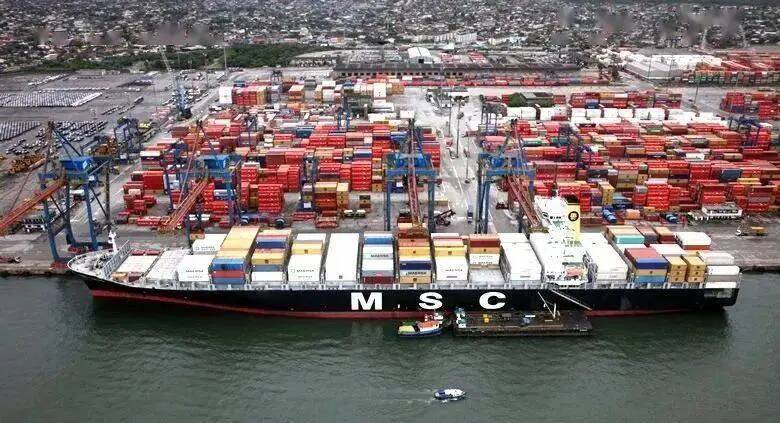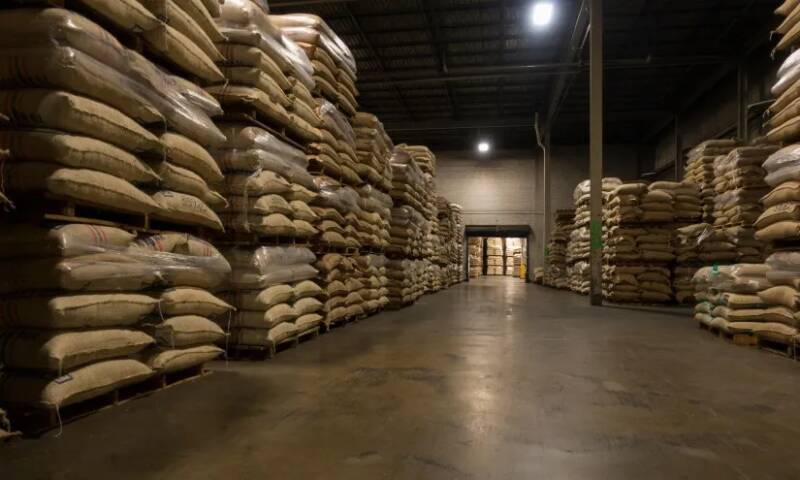The shipping problem of coffee export is serious, and the number of coffee stocks in Europe is declining.
Before January 25, Brazil exported 2486267 bags of coffee, of which 2013917 bags of Arabica beans accounted for 81%, 280995 bags of Robusta beans accounted for 11%, and 191301 bags of instant coffee accounted for 8%, according to the Brazilian Coffee exporters Association (Cecafe). It has decreased by about 10% compared with the same period last year.
The sharp drop in coffee exports in January was due to the lack of port capacity. In mid-to-late January, the port of Santos and Guaruluz International Airport, Brazil's largest export port, were hit by a strike by tax declarants. During the strike, only perishable goods, fresh and live goods, dangerous goods, medicines and food can be cleared, and the rest of the goods will not be cleared. As a result, a lot of losses have been caused, and it is estimated that about 6500 import declarations and about 4000 export declarations at the port of Santos cannot be released.

Although the strike lasted only 4 days, coupled with the current port equipment outdated, outdated management and lack of manpower and other problems, resulting in port congestion, ships were delayed and so on. At present, there are about 848371 bags of coffee waiting to be exported at the Brazilian port.
And European coffee stocks are falling. Coffee stocks at major European ports are drying up, according to the European Coffee Federation (ECF). December 2023 totaled 437059 tons, a decrease of 37.9 per cent compared with January 2023.

This is due to the introduction of non-deforestation regulations (EUDR) in the European Union, which stipulates that no individual or company can sell products involving deforestation, including coffee, cocoa and other products in the EU market. Although it is currently in transition and will not be implemented until December 2024, many traders have reduced their coffee imports.
In addition, the Red Sea crisis intensified, which also led a number of international shipping companies to announce the suspension of Red Sea routes, or choose to divert to the Cape of good Hope. As a result, sea freight rates continue to rise, and transportation costs have increased significantly. Diverting to the Cape of good Hope to avoid the Red Sea route has also raised fuel costs for merchant ships. Container freight along the severely affected Eurasian route has risen by 150%, and as ships have been forced to divert to the Cape of good Hope, major producing countries such as Vietnam and Indonesia in the Asian region face delays of about three weeks in coffee delivery. And the cost of the detour amounts to hundreds of millions of euros a month, so traders are buying fewer coffee beans in Asia.
Important Notice :
前街咖啡 FrontStreet Coffee has moved to new addredd:
FrontStreet Coffee Address: 315,Donghua East Road,GuangZhou
Tel:020 38364473
- Prev

Introduction of Rose Valley Coffee beans in Dashu Manor, Santander, Colombia
Colombia is a land, sea and preparation country located in northern South America, connected with Venezuela, Brazil, Ecuador, Peru, Panama and other countries, bordered by the Pacific Ocean to the west and the Caribbean Sea to the north. The topography of Colombia is roughly divided into the western mountains and the eastern plains, mainly the Andes in the west and Orinocopin in the east.
- Next

Introduction to small cups of espresso: Campbell blue, macchiato, piccolo coffee
Coffee, as one of the three major drinks in the world, has developed a unique system after a long period of precipitation, in which there are many small cups of coffee that are fascinating just by hearing the name, which can be finished by ordinary people in two or three mouthfuls. Focus on a high efficiency to enjoy the fun of coffee drinks. I will take an inventory with you in the front street today.
Related
- What grade does Jamaica Blue Mountain No. 1 coffee belong to and how to drink it better? What is the highest grade of Blue Mountain coffee for coffee aristocrats?
- What are the flavor characteristics of the world-famous coffee Blue Mountain No. 1 Golden Mantelin? What are the characteristics of deep-roasted bitter coffee?
- Can I make coffee a second time in an Italian hand-brewed mocha pot? Why can't coffee be brewed several times like tea leaves?
- Hand-brewed coffee flows with a knife and a tornado. How to brew it? What is the proportion of grinding water and water temperature divided into?
- What is the difference between Indonesian Sumatra Mantinin coffee and gold Mantinin? How to distinguish between real and fake golden Mantelin coffee?
- What does bypass mean in coffee? Why can hand-brewed coffee and water make it better?
- Unexpected! Ruixing Telunsu lattes use a smoothie machine to foam milk?!
- % Arabia's first store in Henan opens into the village?! Netizen: Thought it was P's
- Does an authentic standard mocha coffee recipe use chocolate sauce or powder? Mocha Latte/Dirty Coffee/Salty Mocha Coffee Recipe Share!
- What is the difference between Vietnam egg coffee and Norway egg coffee? Hand-brewed single product coffee filter paper filter cloth filter flat solution!

